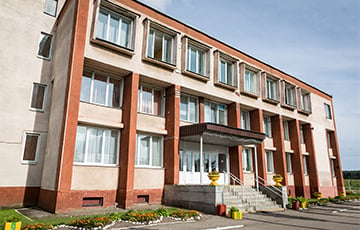‘Optimization Does Not Exactly Mean Liquidation…’
6- 24.12.2024, 13:22
- 8,316

In Dokshytsy, they closed the maternity hospital and are trying to explain to people that black is white.
The channel “Vitebsk, I’m walking” noticed an interesting article that was published on December 19 in the regional newspaper “Rodnyya Vytoki”. The publication is called “Optimization does not exactly mean liquidation…” and, as you understood from the title, in it, the deputy head physician of the Dokshytsy Central District Hospital Ina Kuchyts tries to justify the catastrophe that befell the medical sphere in the region, writes the Telegram channel “White Coats”.
The reason for the article was the appeals to the media by residents of the region, who were quite logically worried that after the closure of the obstetric department and maternity hospital in the regional Central District Hospital, some highly specialized doctors were missing. In the spirit of the current times, the official tried to present an obvious disadvantage as an advantage:
“Closing individual departments or reducing the number of beds allows us to redirect the freed-up financial resources to more popular types of medical care. It is not practical to maintain half-empty wards. As a result of the changes, patients continue to receive services in full, only of even higher quality, and health workers are not laid off, but are assigned to other areas.
As for patients from Dokshytsy, two years ago, stroke patients began to be sent directly to the created inter-district neurological department of the Lepel Central District Hospital. And heart attack patients — to Navapolatsk or Vitsebsk. In Dokshytsy, they remain for treatment only in intensive care. We also send patients with acute surgical pathology to Lepel.
This year, the obstetric department was closed, and along with it the maternity hospital. At the same time, gynecological care is organized on the basis of the surgical department of the hospital.” It is hard to imagine who could be fooled by an attempt to present “black as white”. As an experiment, the “White Coats” showed the article to the GPT chat and asked for comments.
Here is what it answered: “In reality, such optimization often looks like an attempt to save resources by closing “unprofitable” departments and concentrating services in one place. For residents of the area, this can be a minus: if serious health problems arise, they will have to travel much further from home, which is especially difficult for the elderly, low-income people and people without personal transport. And although officials talk about improving the quality of care, many patients may face increased inconvenience and delays, and the level of real access to medical services is decreasing.”
And here is another comment, this time from one of the readers-doctors:
“On the one hand, it is good that local health organizers are still answering questions, and the people asking them are not accused of “discrediting the authorities.”
In essence, the medical official puts on a good face in a bad situation. The districts are becoming depopulated, there is no work, budgets are poor, hospitals do not have enough doctors, there is no equipment, no medicine. So, “optimization” is needed.
And what does “forced optimization” look like without a strategic understanding of this process? From the interview it is clear that in Dokshytsy there is still an intensive care unit (it is not clear with what capabilities, though), but heart attacks, strokes and acute surgical pathology should no longer be treated here. Gynecological patients are treated in the hospital on the basis of the surgical department. Now the obstetrics/maternity hospital has been closed.
We also learn that a general practitioner is a “neurologist, otolaryngologist, dermatologist” and so on down the list. Indeed, why all these delights, who needs those narrow specialists? We are so unpretentious that any qualification will suit us!
“Availability” and “real availability of quality medical care” are about different things. Patients have questions. Ordinary healthcare organizers respond to them as best they can... And relatives of patients who ended up in district intensive care units most often ask, even beg for one thing: transfer them to the “region.”











